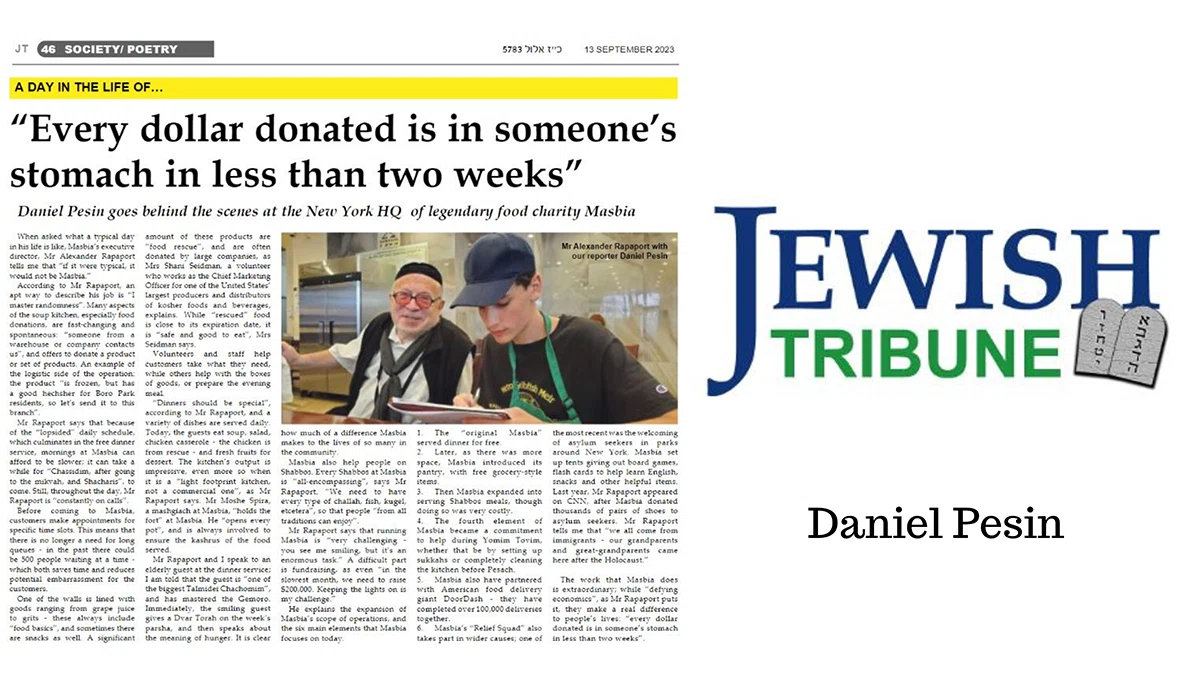Masbia Press Release: Every Dollar Donate Is In Someone’s Stomach In Less Than Two Weeks
Posted on: September 13, 2023
When asked what a typical day in his life is like, Masbia’s executive director, Mr Alexander Rapaport tells me that “if it were typical, it would not be Masbia.”
According to Mr Rapaport, an apt way to describe his job is “I master randomness”. Many aspects of the soup kitchen, especially food donations, are fast-changing and spontaneous: “someone from a warehouse or company contacts us”, and offers to donate a product or set of products. An example of the logistic side of the operation: the product “is frozen, but has a good hechsher for Boro Park residents, so let’s send it to this branch”.
Mr Rapaport says that because of the “lopsided” daily schedule, which culminates in the free dinner service, mornings at Masbia can afford to be slower; it can take a while for “Chassidim, after going to the mikvah, and Shacharis”, to come. Still, throughout the day, Mr Rapaport is “constantly on calls”.
Before coming to Masbia, customers make appointments for specific time slots. This means that there is no longer a need for long queues – in the past there could be 500 people waiting at a time -which both saves time and reduces potential embarrassment for the customers.
One of the walls is lined with goods ranging from grape juice to grits – these always include “food basics”, and sometimes there are snacks as well. A significant amount of these products are “food rescue”, and are often donated by large companies, as Mrs Shani Seidman, a volunteer who works as the Chief Marketing Officer for one of the United States’ largest producers and distributors of kosher foods and beverages, explains. While “rescued” food is close to its expiration date, it is “safe and good to eat”, Mrs Seidman says.
Volunteers and staff help customers take what they need, while others help with the boxes of goods, or prepare the evening meal.
“Dinners should be special”, according to Mr Rapaport, and a variety of dishes are served daily. Today, the guests eat soup, salad, chicken casserole – the chicken is from rescue – and fresh fruits for dessert. The kitchen’s output is impressive, even more so when it is a “light footprint kitchen, not a commercial one”, as Mr Rapaport says. Mr Moshe Spira, a mashgiach at Masbia, “holds the fort” at Masbia. He “opens every pot”, and is always involved to ensure the kashrus of the food served.
Mr Rapaport and I speak to an elderly guest at the dinner service; I am told that the guest is “one of the biggest Talmidei Chachomim”, and has mastered the Gemoro. Immediately, the smiling guest gives a Dvar Torah on the week’s parsha, and then speaks about the meaning of hunger. It is clear how much of a difference Masbia makes to the lives of so many in the community.
Masbia also help people on Shabbos. Every Shabbos at Masbia is “all-encompassing”, says Mr Rapaport. “We need to have every type of challah, fish, kugel, etcetera”, so that people “from all traditions can enjoy”.
Mr Rapaport says that running Masbia is “very challenging -you see me smiling, but it’s an enormous task.” A difficult part is fundraising, as even “in the slowest month, we need to raise$200,000. Keeping the lights on is my challenge.”
He explains the expansion of Masbia’s scope of operations, and the six main elements that Masbia focuses on today.
1. The “original Masbia” served dinner for free.
2. Later, as there was more space, Masbia introduced its pantry, with free grocery-style items.
3. Then Masbia expanded into serving Shabbos meals, though doing so was very costly.
4. The fourth element of Masbia became a commitment to help during Yomim Tovim, whether that be by setting up sukkahs or completely cleaning the kitchen before Pesach.
5. Masbia also have partnered with American food delivery giant DoorDash – they have completed over 100,000 deliveries together.
6. Masbia’s “Relief Squad” also takes part in wider causes; one of the most recent was the welcoming of asylum seekers in parks around New York. Masbia set up tents giving out board games, flash cards to help learn English, snacks and other helpful items. Last year, Mr Rapaport appeared on CNN, after Masbia donated thousands of pairs of shoes to asylum seekers. Mr Rapaport tells me that “we all come from immigrants – our grandparents and great-grandparents came here after the Holocaust.”
The work that Masbia does is extraordinary; while “defying economics”, as Mr Rapaport puts it, they make a real difference to people’s lives: “every dollar donated is in someone’s stomach in less than two weeks”.
For sponsor Masbia Soup Kitchen click here.




